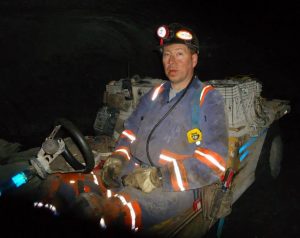News
Mine Safety Officials Won’t Do More To Protect Coal Miners From COVID-19, Letter Says
By: Sydney Boles | Ohio Valley ReSource
Posted on:
WASHINGTON, D.C. (OVR) —The Mine Safety and Health Administration is declining to issue an emergency temporary standard that could protect coal miners whose jobs make them vulnerable to the coronavirus.

In the letter, Wheeler writes, “At this time, MSHA has determined it lacks evidence that COVID-19 poses a grave risk specific to miners.”
MSHA does not keep a comprehensive list of coronavirus cases among coal miners, though it does track mines where cases have been reported. According to a spokesperson for the Department of Labor, MSHA is currently aware of 188 mines that have reported instances of COVID-19.
To bolster its point, MSHA said that states with the highest numbers of working coal miners, including West Virginia, have relatively low rates of COVID-19.
A government official with knowledge of coal mining, who asked to remain anonymous over concerns for their job, said comparing rates of disease in a state to the risk of contracting a disease in a mine is “not incredibly useful.” According to the official, it only takes one case to spark an outbreak in a confined working environment. “Just take the meat-packing industry, for example. The explosion of cases in those facilities occurred in states that had relatively few cases. But the nature of the work, close quarters,, little ability to social distance and no PPE caused the virus to infect upwards of 40-60% of employees.”
West Virginia news outlet WBOY reported this month that a Murray Energy mine in Harrison County had four cases of the virus, qualifying it as an official outbreak according to health department procedures.
“Miners are particularly vulnerable to respiratory illnesses,” said a spokesperson for Senator Tim Kaine of Virginia, who has supported efforts to force MSHA to intervene. “The fact that the agency tasked with protecting them is saying that the risk miners face from COVID-19 is similar to or less than the general population is extremely concerning.”
A government official with knowledge of coal mining, who asked to remain anonymous over concerns for their job, said comparing rates of disease in a state to the risk of contracting a disease in a mine is “not incredibly useful.” According to the official, it only takes one case to spark an outbreak in a confined working environment. “Just take the meat-packing industry, for example. The explosion of cases in those facilities occurred in states that had relatively few cases. But the nature of the work, close quarters,, little ability to social distance and no PPE caused the virus to infect upwards of 40-60% of employees.”
MSHA said existing permanent standards are sufficient to protect miners’ health. But even before the arrival of coronavirus there were indications of serious shortcomings in health protections. Reporting from NPR and the Ohio Valley ReSource found epidemic-levels of black lung disease among working and retired coal miners, demonstrating that existing safety regulations and enforcement procedures still leave miners at risk of respiratory illness. Respiratory disease, in turn, can make people more vulnerable to serious effects from COVID-19 infection.
“Our miners work in close proximity to one another from the time they arrive at the mine site,” said Cecil Roberts, president of the United Mine Workers of America. “They get dressed, travel down the elevator together, ride in the same man trip, work in confined spaces, breathe the same air, operate the same equipment, and use the same shower facilities.”
The UMWA has worked with individual mines to implement uniform safety precautions, including additional disinfection between shifts and limiting the number of miners who enter the mines in confined “man trips.” The union also asked MSHA to issue an emergency temporary standard, even going so far as to file suit in a Washington D.C. circuit court asking a judge to force the agency to act. The judge dismissed that suit.
MSHA said it has implemented reporting procedures for miners who are concerned about COVID exposure in their workplaces. MSHA said it has received complaints through its tip line and, from March 1, 2020 to August 14, 2020, has issued 122 citations for violations of various regulations regarding sanitary conditions that could contribute to the spread of COVID-19.

